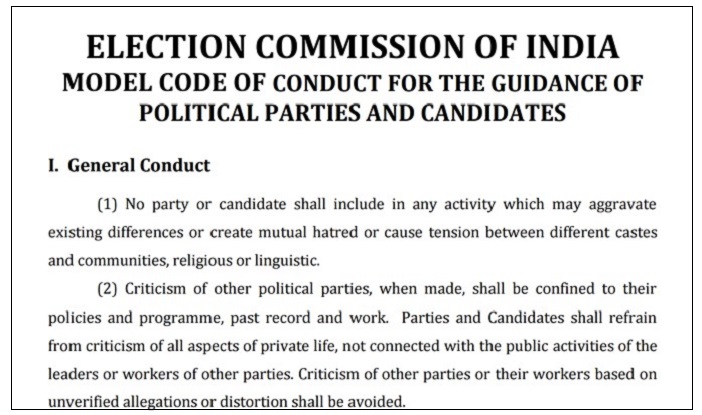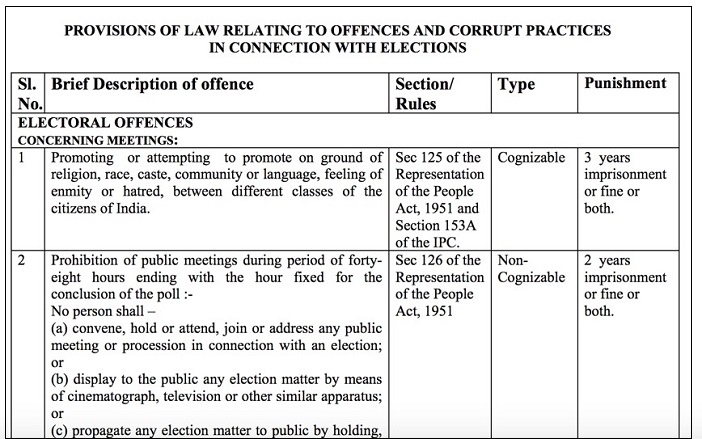[orc]The Election Commission of India (ECI) enforces the Model of Conduct (MCC) during elections. While multiple cases of MCC violations come to the notice of the ECI, the guilty are let off with a warning in most cases.
The Model Code of Conduct (MCC) kicks in as soon as elections to either state assemblies or the Lok Sabha are announced by the Election Commission of India (ECI). The MCC is a set of instructions to be followed by both political parties and candidates contesting elections. The MCC is a set of guidelines and instructions on general conduct, campaigning, meetings etc. during elections. The MCC is in place till the entire process of elections is complete.
Guidelines for General Conduct
The following are the important guidelines for general conduct when the MCC is in place.
- No party or candidate should include in any activity which may aggravate existing differences or create mutual hatred or cause tension between different castes and communities, religious or linguistic.
- Criticism of other political parties, when made, should be confined to their policies and programme, past record and work. Parties and Candidates should refrain from criticism of all aspects of private life, not connected with the public activities of the leaders or workers of other parties. Criticism of other parties or their workers based on unverified allegations or distortion should be avoided.
- There should be no appeal to caste or communal feelings for securing votes. Mosques, Churches, Temples or other places of worship should not be used as forum for election propaganda.
- All parties and candidates should avoid activities which are corrupt practices and offences under the election law, such as bribing of voters, intimidation of voters, impersonation of voters, canvassing within 100 meters of polling stations, holding public meetings during the period of 48 hours ending with the hour fixed for the close of the poll, and the transport and conveyance of voters to and from polling station.

Any violation of the above guidelines will invite a notice from the ECI as to why action should not be taken and why a case should not be registered against the guilty. Notices have been issued to candidates from various political parties for violation of model code of conduct. Individuals from across party lines like the Delhi Chief Minister Arvind Kejriwal and former Goa Chief Minister Manohar Parrikar were served notices by the ECI for violating the MCC. Prime Minister Narendra Modi was also served notices in the past for violation of the MCC. Congress President Rahul Gandhi was also served a notice by the ECI for MCC violations.
Guidelines relating to Meetings & Processions
The MCC also contains guidelines with respect to conduct of meetings & holding processions. Some of the important guidelines are the following
- The party or candidate should inform the local police authorities of the venue and time of any proposed meeting well in time so as to enable the police to make necessary arrangements for controlling traffic and maintaining peace and order.
- If permission or license is to be obtained for the use of loudspeakers or any other facility in connection with any proposed meeting, the party or candidate should apply to the authority concerned well in advance and obtain such permission or license.
- Organizers of a meeting should invariably seek the assistance of the police on duty for dealing with persons disturbing a meeting or otherwise attempting to create disorder. Organizers themselves should not take action against such persons.
- A Party or candidate organizing a procession should decide before hand the time and place of the starting of the procession, the route to be followed and the time and place at which the procession will terminate. There should ordinarily be no deviation from the programme.
- The organizers should take steps in advance to arrange for passage of the procession so that there is no block or hindrance to traffic. If the procession is very long, it shall be organized in segments of suitable lengths, so that at convenient intervals, especially at points where the procession has to pass road junctions, the passage of held up traffic could be allowed by stages thus avoiding heavy traffic congestion.
- Processions should be so regulated as to keep as much to the right of the road as possible and the direction and advice of the police on duty shall be strictly complied with.
- If two or more political parties or candidates propose to take processions over the same route at about the same time, the organizers should establish contact well in advance and decide upon the measures to be taken to see that the processions do not clash or cause hindrance to traffic. The assistance of the local police should be availed of for arriving at a satisfactory arrangement.
Guidelines for the Polling Day and at the Polling Booth
On the day the polling, all the political parties and candidates should abide by the following instructions.
- Refrain from serving or distributing liquor on polling day and during the forty-eight hours preceding it.
- Not allow unnecessary crowd to be collected near the camps set up by the political parties and candidates near the polling booths so as to avoid Confrontation and tension among workers and sympathizers of the parties and the candidate.
- Co-operate with the authorities in complying with the restrictions to be imposed on the plying of vehicles on the polling day and obtain permits for them which should be displayed prominently on those vehicles.
- Excepting the voters, no one without a valid pass from the Election Commission shall enter the polling booths.
Other Guidelines
Apart from these, there are other guidelines for election observers and the party in power. The MCC also stipulates guidelines for election manifestos. The following are the some of the important guidelines for the party in power.
- The party in power whether at the Centre or in the State or States concerned, should ensure that no cause is given for any complaint that it has used its official position for the purposes of its election campaign and in particular,
- The Ministers should not combine their official visit with electioneering work and should not also make use of official machinery or personnel during the electioneering work
- Government transport including official air-crafts, vehicles, machinery and personnel should not be used for furtherance of the interest of the party in power.
- Public places such as maidans etc., for holding election meetings, and use of helipads for air-flights in connection with elections should not be monopolized by the party in power. Other parties and candidates should also be allowed the use of such places and facilities on the same terms and conditions on which they are used by the party in power.
- Rest houses, bungalows or other Government accommodation should not be monopolized by the party in power or its candidates and such accommodation should be allowed to be used by other parties and candidates in a fair manner.
- Issue of advertisement at the cost of public exchequer in the newspapers and other media and the misuse of official mass media during the election period for partisan coverage of political news and publicity regarding achievements with a view to furthering the prospects of the party in power should be scrupulously avoided.
- Ministers and other authorities should not sanction grants/payments out of discretionary funds from the time elections are announced by the Commission and from the time elections are announced by Commission, Ministers and other authorities should not
- announce any financial grants in any form or promises thereof
- lay foundation stones etc. of projects or schemes of any kind
- make any promise of construction of roads, provision of drinking water facilities etc.
- make any ad-hoc appointments in Government, Public Undertakings etc. which may have the effect of influencing the voters in favor of the party in power.
Is the enforcement effective?
While the ECI does issue notices to politicians from various parties for the violation of the MCC, it generally does not go to the extent of taking any action. The issue ends with a warning to the candidate not to repeat the same mistake. Though there are multiple electoral offences as defined under various laws, rarely is action taken in any of these cases.

Featured Image: Model Code of Conduct



6 Comments
Pingback: WhatsApp testing tighter restrictions on message forwarding in India | Arcane | Blog.
Pingback: WhatsApp testing tighter restrictions on message forwarding in India – Jalvis Tech
Pingback: WhatsApp testing tighter restrictions on message forwarding in India - aadhu.com
Pingback: WhatsApp testing tighter restrictions on message forwarding in India - Lifetwist.Net
Pingback: WhatsApp testing tighter restrictions on message forwarding in India – izOn9.COM
Pingback: Phone Hacks - Notification Repeater fixes broken notifications on some MIUI 10 devices like the Xiaomi Mi Mix 3 - phonehacks.club